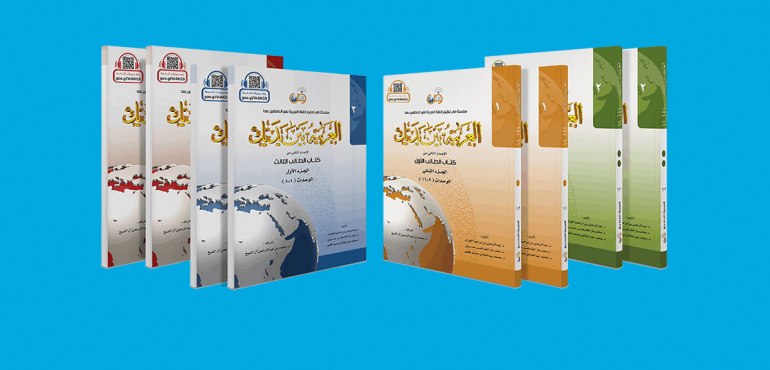
! Note: You can take Free Trial Lesson for this course with no obligations.
Arabic Between Your Hands 4 (2) (Al-Arabiyyah Bayna Yadayk)
Book Four - Part Two
- Level: Fluency
- Study duration: 6 months
- Target group: adults
- Number of units: 8 units
Book Topics
Globalization - Cleanliness - The Seeker of Truth - Classes of Friends - Effects of Islamic Culture - The Concept of Security - Protection from Pollution - Types of Energy.
Listening comprehension topics
Omariya stories - Ants and candy - Al-Tufail bin Amr - To the youth - Our minorities in the world - Do your child's questions worry you - Causes of marital disputes - Types of energy.
How much you can benefit from the course?
- Using classical Arabic without using an interlanguage or speaking in dialects.
- Interacting with native speakers verbally and in writing, expressing himself and his community appropriately.
- Developing the texts that the student studies, and progress new vocabulary and expressions.
- Full focus on grammar and morphology and the use of live texts from the Holy Quran and the Prophetic Sunnah.
- Gaining knowledge of the Arab-Islamic culture and Acquiring the customs and traditions of Arab countries.
- Developing the student’s listening skills; each unit includes two separate texts, one of which may be related to the unit’s topic and the other is different.
- Focus on oral skills and interest in intensive reading.
- Linking new vocabulary and expressions to verses from the Holy Qur’an and the noble Prophetic hadiths, to increase understanding of the Qur’anic texts.
- Practice for exams to knowing how much progress the student has made.
Teaching method
- Each unit includes an intensive reading text; where the student reads the text in paragraphs, one paragraph after the other, to focus on the reading skill.
- Start with an introduction to the text by answering a set of questions that help in understanding the lesson.
- Studying new vocabulary in each text and using it in sentences without using the interlanguage, and studying the plural, singular, antonyms, and verb conjugation.
- Asking the student what he understood from each paragraph, or to summarizing the paragraph whose vocabulary was explained.
- Comprehension exercises to measure the student’s understanding of the lesson.
- Writing a general summary of the unit topic, using some ideas and elements.
- Studying the morphological rules in detail and explaining extensively for each lesson; such as: the verb noun - derivatives - as well as studying the grammatical rules; such as: sentences that have a place for Syntaxes and those that do not, with intensive training on them. Here, the progress in the level of grammatical and morphological rules that the student studies is observed.
- A comprehensive revision of grammar and morphology lessons in general to familiarize the student with everything he has studied before.
- Listening comprehension exercises, which include two texts that strengthen the student’s listening skills.
- Advanced expression exercises (dialogue and debate), which include managing a dialogue or debate between two parties (two students - two teams), and each party presents the idea and defends it with evidence and proof, with the necessity of respecting the other, adhering to the etiquette of dialogue, and speaking only in classical Arabic.
- Focus on intensive reading, where the lesson (extensive reading) is presented, and this lesson differs from the topic of the unit, such as: Lessons from the authentic Sunnah, followed by intensive exercises on the entire text and its vocabulary.
- Paying attention to writing and research exercises, using references and the international network.
- Paying attention to handwriting, Nask hhandwriting and Ruq’ah handwriting scripts, and explaining the correct way to write.
- Study another lesson on grammar and morphology, with intensive exercises on them.
- Using interactive tools and activities with the student during the lesson and paying attention to giving assignments that helps with revision.
- Training the student to answer the final exams.

